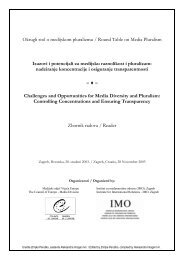almanac on security sector oversight in the Western Balkans
almanac on security sector oversight in the Western Balkans
almanac on security sector oversight in the Western Balkans
Create successful ePaper yourself
Turn your PDF publications into a flip-book with our unique Google optimized e-Paper software.
Accountability of Statutory Security Actors <strong>in</strong> <strong>the</strong> <strong>Western</strong> <strong>Balkans</strong><br />
wave of changes swept across Maced<strong>on</strong>ia <strong>in</strong> 2001, giv<strong>in</strong>g rise to ethnic and religious<br />
c<strong>on</strong>sequences of <strong>the</strong> wars <strong>in</strong> <strong>the</strong> former Yugoslavia. However, <strong>the</strong> beg<strong>in</strong>n<strong>in</strong>g of ethnic<br />
armed c<strong>on</strong>flicts was prevented <strong>in</strong> Maced<strong>on</strong>ia at an early stage by foreign <strong>in</strong>terventi<strong>on</strong>,<br />
and <strong>the</strong>n frozen (K<strong>on</strong>eska and Kotevska, 2011, pp.5-6, 17).<br />
Unlike <strong>the</strong> former Yugoslav countries, <strong>the</strong> c<strong>on</strong>sequences of <strong>the</strong> collapse of socialism <strong>in</strong><br />
Albania were felt as late as 1997. After <strong>the</strong> collapse of <strong>the</strong> regime, <strong>the</strong> country faced<br />
a real threat of civil war. The effects of <strong>the</strong> wars <strong>in</strong> <strong>the</strong> former Yugoslavia, al<strong>on</strong>g with<br />
<strong>the</strong> collapse of <strong>the</strong> Albanian state, facilitated <strong>the</strong> irreversible penetrati<strong>on</strong> of <strong>the</strong> EU,<br />
NATO, and <strong>the</strong> United States <strong>in</strong>to <strong>the</strong> <strong>Western</strong> <strong>Balkans</strong>. Ever s<strong>in</strong>ce, a Euro-Atlantic<br />
overlay has been spread <strong>in</strong> <strong>the</strong> regi<strong>on</strong>.<br />
The c<strong>on</strong>texts, pace, c<strong>on</strong>tent and scope of SSR processes <strong>in</strong> <strong>the</strong> <strong>Western</strong> Balkan countries<br />
were, and still are, marked by three crucial similarities. The first similarity is <strong>the</strong><br />
result of <strong>the</strong> participati<strong>on</strong> of five countries <strong>in</strong> <strong>the</strong> regi<strong>on</strong> – Bosnia and Herzegov<strong>in</strong>a,<br />
Croatia, Kosovo, M<strong>on</strong>tenegro, Serbia 190 - <strong>in</strong> <strong>the</strong> wars waged <strong>on</strong> ex-Yugoslav territory,<br />
and <strong>the</strong> direct exposure of <strong>the</strong> two rema<strong>in</strong><strong>in</strong>g countries – Albania and Maced<strong>on</strong>ia – to<br />
<strong>the</strong>ir c<strong>on</strong>sequences. The sec<strong>on</strong>d similarity results from <strong>the</strong> fact that three new states<br />
– Bosnia and Herzegov<strong>in</strong>a, Croatia, and Kosovo– and <strong>the</strong>ir <strong>security</strong> <strong>in</strong>stituti<strong>on</strong>s were<br />
created and shaped under <strong>the</strong> c<strong>on</strong>diti<strong>on</strong>s of a massive, <strong>in</strong>ternal and/or external use<br />
of armed force. The state and its <strong>security</strong> forces were created <strong>in</strong> Maced<strong>on</strong>ia, directly<br />
transformed <strong>in</strong> Serbia and M<strong>on</strong>tenegro 191 , and <strong>in</strong>directly transformed <strong>in</strong> Albania under<br />
<strong>the</strong> <strong>in</strong>fluence of <strong>the</strong> immediate war envir<strong>on</strong>ment (Dyrmishi et al., 2011, pp.7-11).<br />
The first two similarities led to <strong>the</strong> third important similarity of SSR c<strong>on</strong>texts. Due to<br />
wars and/or <strong>in</strong>ternal c<strong>on</strong>flicts, <strong>the</strong> irreversible part<strong>in</strong>g of <strong>the</strong> <strong>Western</strong> Balkan countries<br />
with socialism was first prevented and/or delayed, and <strong>the</strong>n c<strong>on</strong>siderably slowed<br />
down and made difficult <strong>on</strong> many levels. The absence of <strong>in</strong>ternal c<strong>on</strong>sensus <strong>on</strong> <strong>the</strong><br />
needs, goals, manner and pace of <strong>the</strong> dissoluti<strong>on</strong> of <strong>the</strong> old regime c<strong>on</strong>tributed to this<br />
situati<strong>on</strong>. Dur<strong>in</strong>g <strong>the</strong> 1990s, <strong>the</strong> ec<strong>on</strong>omic and social price of post-socialist transiti<strong>on</strong><br />
<strong>in</strong> <strong>the</strong>se countries – <strong>in</strong>clud<strong>in</strong>g <strong>the</strong> costs of <strong>the</strong> establishment and transformati<strong>on</strong> of <strong>the</strong><br />
military, police and <strong>in</strong>telligence services – became enormously high. At <strong>the</strong> same time,<br />
<strong>the</strong> will<strong>in</strong>gness of local populati<strong>on</strong>s to pay this price was progressively dim<strong>in</strong>ish<strong>in</strong>g.<br />
The price became even higher when it <strong>in</strong>cluded costs of war damages, and this was<br />
ultimately far more than <strong>the</strong> populati<strong>on</strong>s of <strong>the</strong> states <strong>in</strong> <strong>the</strong> regi<strong>on</strong> were able to pay.<br />
The grow<strong>in</strong>g number of transiti<strong>on</strong> losers, toge<strong>the</strong>r with <strong>the</strong> costs of war, generated<br />
str<strong>on</strong>g <strong>in</strong>ternal threats to pers<strong>on</strong>al and collective safety. This partly expla<strong>in</strong>s why state<br />
authorities were extremely cautious <strong>in</strong> reorganis<strong>in</strong>g and/or reform<strong>in</strong>g <strong>the</strong> (<strong>in</strong>herited)<br />
military, police and <strong>in</strong>telligence services.<br />
190 We will set aside <strong>the</strong> debate <strong>on</strong> perpetrators of <strong>the</strong> wars waged <strong>on</strong> <strong>the</strong> territory of former Yugoslavia,<br />
i.e. <strong>on</strong> agressors and victims. We <strong>in</strong>cluded Serbia and M<strong>on</strong>tenegro <strong>in</strong> this group as <strong>the</strong>y, c<strong>on</strong>trary<br />
to <strong>the</strong> claims of <strong>the</strong>ir former and current authorities, did participate <strong>in</strong> <strong>the</strong>se wars from April 1992<br />
<strong>on</strong>wards, first with<strong>in</strong> SFRY and later <strong>in</strong> <strong>the</strong> Federal Republic of Yugoslavia (1992-2003).<br />
191 Start<strong>in</strong>g <strong>in</strong> 1992 <strong>the</strong>y were members of <strong>the</strong> Federal Republic of Yugoslavia (FRY), and from 2003<br />
until 2006 of <strong>the</strong> State Uni<strong>on</strong> of Serbia and M<strong>on</strong>tenegro (SU SaM).<br />
217<br />
Almanac <strong>on</strong> Security Sector Oversight <strong>in</strong> <strong>the</strong> <strong>Western</strong> <strong>Balkans</strong>



